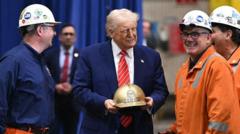Is Japan's Nippon's Takeover of US Steel a Game Changer?

Nippon Steel's Strategic Acquisition of US Steel: A Game Changer for American Manufacturing
The recent acquisition of US Steel by Japanese firm Nippon Steel marks a pivotal moment in the global steel industry. This $14.9 billion deal not only reshapes Nippon's presence in the U.S. market but also has significant implications for the American manufacturing landscape. By agreeing to unusual control concessions to the U.S. government, Nippon has navigated a complex political landscape to secure this purchase, which promises to protect jobs and bolster the struggling steel sector. This article delves into the details of the acquisition, the strategic implications for both companies, and what it means for the future of the U.S. steel industry.
The Acquisition Details: What You Need to Know
Nippon Steel's acquisition of US Steel is set to create one of the largest steelmakers in the world. Here are the key details of the deal:
- Purchase Price: Nippon Steel agreed to pay $55 per share for US Steel, amounting to a total of $14.9 billion.
- Debt Assumption: The agreement includes taking on US Steel's existing debt, which adds to the financial commitment involved in the acquisition.
- Investment Commitment: Nippon has pledged to invest $11 billion in US Steel over the next five years, focusing on technological advancements and infrastructure improvements.
- Golden Share: The U.S. government will hold a "golden share" in the company, allowing it to oversee significant decisions regarding job transfers, production locations, and factory operations.
- Job Protection: Nippon and US Steel assert that this partnership will protect and create more than 100,000 jobs, ensuring the company remains a vital part of the American economy.
The Political Landscape: From Opposition to Approval
The path to this acquisition was fraught with political challenges. Initially, the deal faced scrutiny during the 2020 presidential election, with both President Donald Trump and his Democratic contenders voicing concerns about foreign ownership of a major U.S. steel producer. The political climate became a critical factor in the deal's progression.
However, the situation shifted when Nippon made concessions to address national security concerns. After discussions with local officials and industry leaders, Trump reversed his stance, granting the necessary executive order to move forward with the acquisition. This decision highlights the importance of local economic impacts and job preservation in political decision-making.
Implications for US Steel and the American Steel Industry
The acquisition has far-reaching implications for both US Steel and the broader steel industry in the United States. Here are some key points to consider:
1. Strengthening U.S. Steel Capacity
With Nippon's investment of $11 billion, US Steel is positioned to modernize its facilities and enhance production capabilities. This investment is crucial as the steel industry faces increased competition from overseas producers. By improving technology and infrastructure, US Steel can better compete in the global market, ensuring its long-term viability.
2. Job Preservation and Creation
The commitment to protect and create more than 100,000 jobs is a significant aspect of the deal. The steel industry has been a cornerstone of American manufacturing, and job losses in this sector can have devastating effects on local economies. Nippon's assurances help to alleviate concerns about job security and provide a more stable outlook for workers in the industry.
3. Maintaining American Identity
Nippon's promise to retain US Steel's headquarters in Pittsburgh and to appoint American citizens to key management positions reinforces the company's identity as a U.S. entity. This commitment to American leadership is vital for maintaining public trust and ensuring that the company's operations align with national interests.
4. Regulatory Oversight and National Security
The establishment of a "golden share" for the U.S. government introduces a layer of regulatory oversight that is unusual in foreign acquisitions. This move addresses national security concerns and ensures that key decisions affecting the American workforce and production capabilities remain under U.S. control. Such measures could set a precedent for future foreign investments in critical industries.
Challenges Ahead for Nippon Steel and US Steel
Despite the positive aspects of this acquisition, several challenges lie ahead for both Nippon Steel and US Steel:
1. Integration of Operations
Integrating two large companies with different cultures and operational practices can be challenging. Nippon will need to navigate potential conflicts and ensure that the best practices from both organizations are combined effectively. This process will require careful planning and execution to minimize disruptions.
2. Market Volatility
The steel market is subject to fluctuations based on global demand, trade policies, and economic conditions. Nippon Steel must remain agile in adapting to these changes while managing the expectations of investors and the U.S. government. Any challenges in the market could impact the anticipated benefits of the acquisition.
3. Regulatory Compliance
With the "golden share" arrangement, Nippon Steel will face heightened scrutiny from U.S. regulators. Compliance with the agreed-upon conditions is crucial for the long-term success of the acquisition. Any failure to adhere to these commitments could lead to governmental intervention or negative public perception.
The Future of Steel Manufacturing in the U.S.
The successful execution of this acquisition could pave the way for a revitalized steel industry in the United States. As Nippon Steel invests in U.S. Steel, the industry may witness a renaissance characterized by innovation, job preservation, and increased competitiveness in the global market.
Moreover, this acquisition could serve as a model for future foreign investments in critical industries, balancing the need for foreign capital with the safeguarding of national interests. If managed effectively, Nippon Steel's entry into the U.S. market may lead to a stronger, more resilient steel industry that benefits both American workers and the economy as a whole.
Conclusion: A New Chapter for US Steel
The acquisition of US Steel by Nippon Steel is not just a business transaction; it is a significant development with implications for the future of American manufacturing and national security. As the steel industry faces unprecedented challenges, this partnership offers an opportunity to strengthen domestic production and protect jobs. With Nippon's commitment to invest in American operations and maintain key leadership positions, US Steel may emerge from this transition as a robust player in the global steel market.
As we look ahead, the success of this acquisition will depend on strategic execution and ongoing collaboration between Nippon Steel, US Steel, and the U.S. government. Will this partnership lead to a renaissance in the American steel industry, or will challenges hinder progress? Only time will tell.
FAQs
What is the significance of Nippon Steel acquiring US Steel?
The acquisition strengthens Nippon's presence in the U.S. steel market, ensures job preservation, and brings significant investment to modernize US Steel's operations.
How will the "golden share" affect the acquisition?
The "golden share" allows the U.S. government to have oversight over key decisions, ensuring that national security concerns are addressed and that the interests of American workers are prioritized.
What are the potential challenges Nippon Steel may face post-acquisition?
Challenges include integrating operations, navigating market volatility, and ensuring compliance with regulatory requirements established by the U.S. government.
This acquisition signals a pivotal moment for the steel industry and holds promise for revitalization. How do you see the future of steel manufacturing evolving in the U.S. with this new partnership? #SteelIndustry #NipponSteel #USSteel
Published: 2025-06-18 15:16:03 | Category: technology



